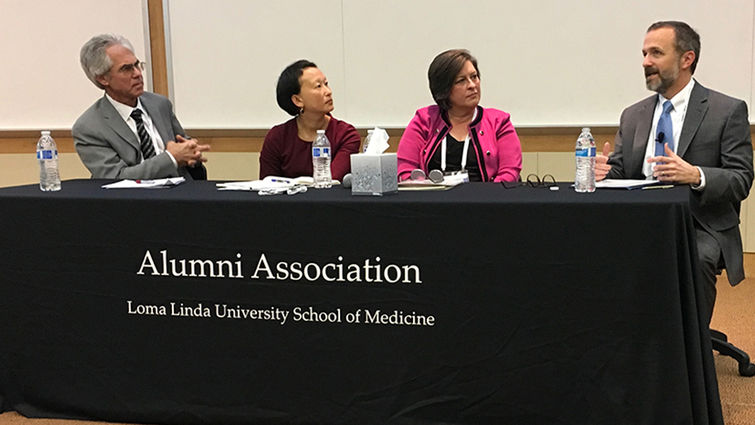
Panel discussion
The ethical implications of practicing medicine as a Christian came to the fore during the 2018 Provonsha Lecture at Loma Linda University Health March 2.
Guest lecturer Farr Curlin, MD, professor of medical humanities at Duke University School of Medicine and co-director of the Theology, Medicine and Culture Initiative at Duke Divinity School, spoke about “What does medicine have to do with the healing ministry of Jesus Christ?”
“Being genuinely whole is more than having favorable health outcomes,” Curlin said. He spoke of “practicing medicine Christianly,” which he posited may sometimes mean promising less by not sacrificing a practitioner’s ethics to fulfill a patient’s desire that contradicts.
Curlin said Christians are obligated to offer the best scientific medicine with the traditional goal of preserving health and life.
Ultimate hope lies in God, not medicine, and practicing healthcare accordingly “bears witness to the truth that only Jesus makes men whole,” Curlin concluded.
Loma Linda scholars respond
Responding panelists from Loma Linda University Health were psychologist Barbara Couden Hernandez, PhD; physician and ethicist Grace Oei, MD; and theologian Richard Rice, PhD.
Couden Hernandez brought her perspective, backed up by research, that who the provider is, and how he or she interacts with a patient, has a huge impact on how the patient responds and resulting health outcomes.
That relationship creates healing, she said; patients must feel heard and embraced, just as Jesus’ acceptance of Zacchaeus led to the healing of his soul. The sharing of Christ “in our person,” and the subsequent patient healing, is ultimately “more important than cure,” she said.
Oei opened her response by sharing a quote from Ellen White, co-founder of Loma Linda University Health, stating that the role of medical missionaries is to use the means of medicine that God has provided, but that He is the healer. Loma Linda’s mission “to continue the teaching and healing ministry of Jesus Christ” must remain focused on ministry. She cautioned against the pitfalls of letting the pressures of running a large system override patient comfort and well-being.
Rice noted the importance of clearly distinguishing between “what a physician can do and what only God can do.” A patient’s body is commodified and over-valued when it is considered the most important thing about him/her, he said.
Medicine should thus affirm bodily health without exaggerating its significance.
About the Provonsha Lecture
The annual Provonsha Lecture is named after Jack Provonsha, MD, founding director of the Center for Christian Bioethics at Loma Linda University.
For 33 years the center has led and enhanced teaching, research and service in biomedical ethics and related fields at Loma Linda University Health.
